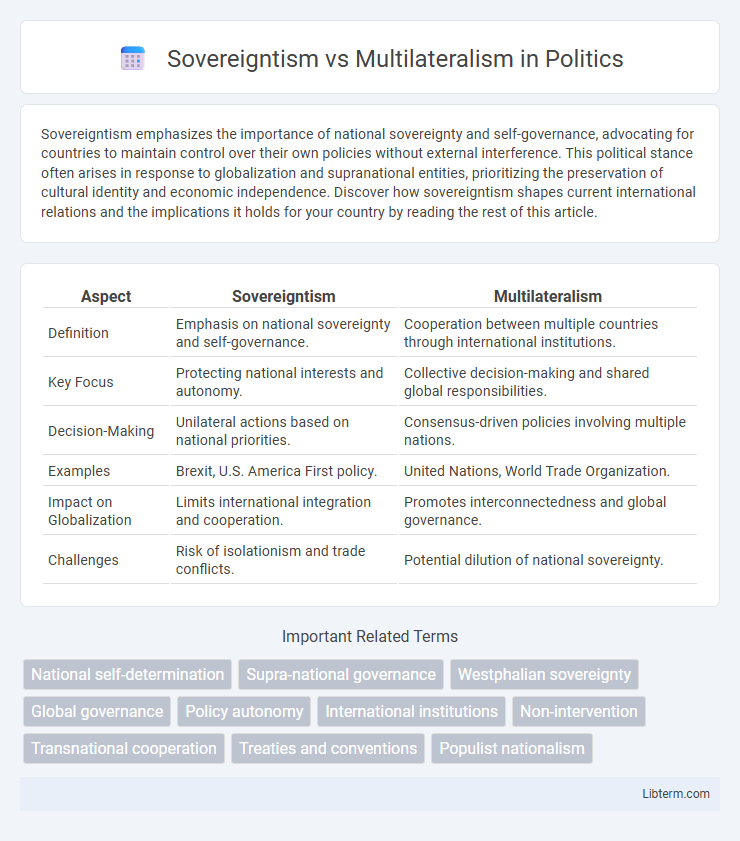Sovereigntism emphasizes the importance of national sovereignty and self-governance, advocating for countries to maintain control over their own policies without external interference. This political stance often arises in response to globalization and supranational entities, prioritizing the preservation of cultural identity and economic independence. Discover how sovereigntism shapes current international relations and the implications it holds for your country by reading the rest of this article.
Table of Comparison
| Aspect | Sovereigntism | Multilateralism |
|---|---|---|
| Definition | Emphasis on national sovereignty and self-governance. | Cooperation between multiple countries through international institutions. |
| Key Focus | Protecting national interests and autonomy. | Collective decision-making and shared global responsibilities. |
| Decision-Making | Unilateral actions based on national priorities. | Consensus-driven policies involving multiple nations. |
| Examples | Brexit, U.S. America First policy. | United Nations, World Trade Organization. |
| Impact on Globalization | Limits international integration and cooperation. | Promotes interconnectedness and global governance. |
| Challenges | Risk of isolationism and trade conflicts. | Potential dilution of national sovereignty. |
Defining Sovereigntism: Principles and Origins
Sovereigntism centers on the principle of absolute national autonomy, emphasizing the supremacy of a state's authority within its own borders without external interference. Originating from Westphalian sovereignty established in 1648, it asserts that each state has exclusive rights to govern its territory, uphold its laws, and control its resources. This doctrine often contrasts with multilateralism by prioritizing national interests over collective international decision-making processes.
The Essence of Multilateralism in Global Governance
Multilateralism in global governance emphasizes cooperation among multiple nations to address shared challenges through international institutions like the United Nations and World Trade Organization. It fosters collective decision-making, ensuring that no single country dominates while promoting equity, transparency, and adherence to international law. This approach contrasts with sovereigntism, which prioritizes national autonomy and unilateral action over collaborative problem-solving.
Historical Evolution: Sovereigntism vs Multilateralism
Sovereigntism emerged as a dominant political philosophy in the 17th century with the Peace of Westphalia, establishing nation-states' supreme authority over their territories. Multilateralism gained prominence after World War II, institutionalizing cooperative frameworks like the United Nations and the Bretton Woods system to manage international relations. The historical evolution reflects a shift from exclusive state sovereignty toward collaborative global governance mechanisms addressing complex transnational challenges.
Key Arguments for Sovereigntism
Sovereigntism emphasizes the primacy of national self-determination, arguing that states should maintain full control over their laws, borders, and policies to protect cultural identity and political autonomy. Proponents contend that global governance structures often undermine local decision-making, leading to diluted sovereignty and potential economic disadvantages. This perspective prioritizes national interests and the ability of governments to respond directly to their citizens without external interference.
Major Benefits of Multilateralism
Multilateralism promotes global cooperation and stability by enabling countries to address cross-border challenges such as climate change, security threats, and pandemics through collective action and shared resources. It enhances economic growth by facilitating international trade agreements and reducing barriers, fostering interdependence and innovation among nations. The inclusive decision-making process under multilateral frameworks strengthens diplomatic relations and conflict resolution, ensuring a more peaceful and interconnected world order.
Sovereigntism in Practice: Notable Country Examples
Sovereigntism in practice is exemplified by countries such as the United States under the Trump administration, which emphasized national interests and withdrew from international agreements like the Paris Climate Accord and the Trans-Pacific Partnership. China also demonstrates sovereigntism through its assertive control over regional disputes and reluctance to fully commit to multilateral frameworks that might limit its strategic autonomy. Russia's approach highlights sovereigntism by prioritizing national sovereignty in diplomatic relations and resisting Western-led multilateral institutions.
Multilateral Institutions: Roles and Impact
Multilateral institutions like the United Nations, World Trade Organization, and International Monetary Fund play crucial roles in fostering international cooperation, setting global norms, and addressing transnational challenges such as climate change, security, and economic stability. These organizations facilitate dialogue among sovereign states, promote conflict resolution, and coordinate collective action to achieve shared goals that individual countries cannot effectively tackle alone. Their impact is evident in advancing peacekeeping operations, establishing trade regulations, and mobilizing resources for sustainable development worldwide.
Conflict Zones: When Sovereigntism Clashes with Multilateralism
Sovereigntism in conflict zones often drives states to prioritize unilateral control over territory and decision-making, undermining multilateral peacekeeping efforts and diplomatic negotiations. Multilateralism relies on cooperative frameworks like the United Nations and regional alliances to address conflicts, promoting shared security and conflict resolution mechanisms. The clash arises when sovereign states reject external intervention, leading to stalemates that prolong violence and hinder international consensus on peacebuilding initiatives.
Balancing National Interests and Global Cooperation
Sovereigntism emphasizes protecting national sovereignty and prioritizing state interests over global agreements, often resisting international regulations that may constrain domestic policies. In contrast, multilateralism promotes collaborative decision-making through international institutions, facilitating global cooperation to address transnational challenges like climate change and security threats. Balancing national interests with global cooperation requires negotiating sovereignty concerns while engaging in multilateral frameworks that enhance collective problem-solving and shared benefits.
Future Trends: Navigating Between Sovereigntism and Multilateralism
Future trends indicate a complex balancing act between sovereigntism and multilateralism, as nations prioritize national interests while recognizing the necessity of global collaboration in addressing transnational challenges such as climate change, security, and economic stability. Technological advancements and increasing geopolitical shifts drive states to assert sovereignty through digital borders and strategic alliances, yet multilateral institutions like the United Nations and World Trade Organization remain crucial platforms for coordinated policy-making and conflict resolution. Emerging global dynamics suggest a hybrid approach where flexibility in alliances and pragmatic cooperation become key to navigating the evolving international order.
Sovereigntism Infographic

 libterm.com
libterm.com